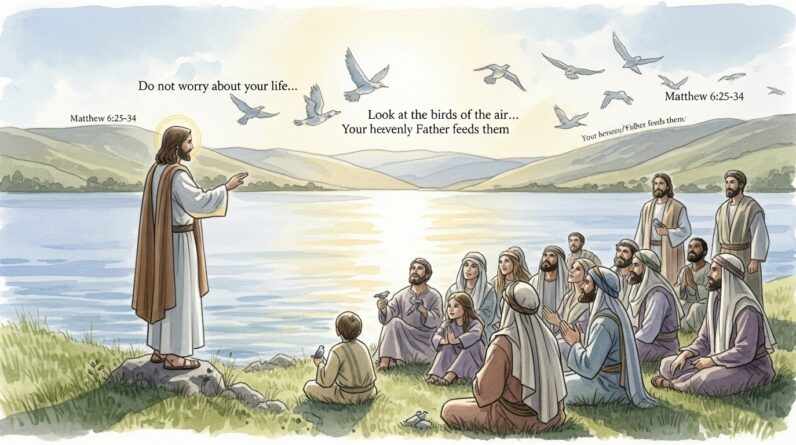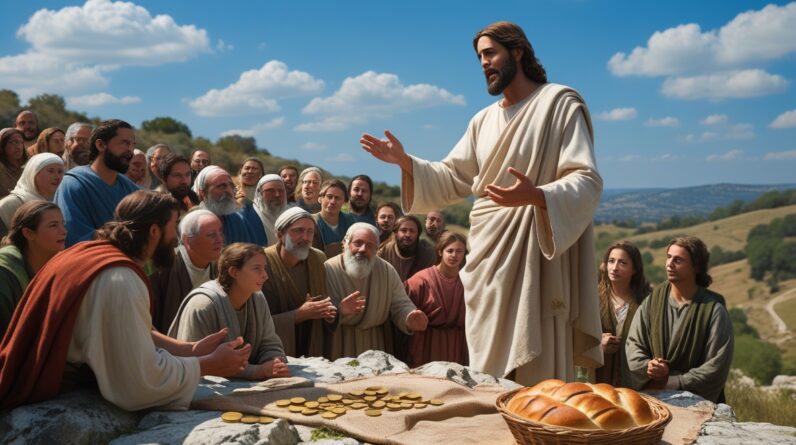How To Trust God With Your Finances: 7 Biblical Steps
What a world we live in—a dizzying interplay of numbers and markets, a constant flow of currencies and credit scores. Financial stress is increasingly commonplace, and it can wear you down more than you’d like to admit. The silent prayers uttered during sleepless nights about bills, tuition, or even groceries—sound familiar? Venturing into the complexity of finances can seem like you’re wandering through a labyrinth with no map or compass. But what if I tell you there’s solace to be found by trusting God with your finances? It might feel like a leap into the unknown, but it’s exactly that trust that can gift you a peace that the modern world can’t.
Why Trusting God With Money Brings Peace
When you’re knee-deep in financial stress, it’s easy to feel as though you’re entirely alone in your struggle. However, the act of inviting God into your financial life pivots the dynamics entirely. Trusting God with finances is akin to laying your worries at the feet of an attentive and understanding listener. This simple act can bring a deep-seated peace—a transformative kind, grounding you amid the frenzy of financial woes. It’s an exercise in release, taking the stress that occupies so much of your mental real estate and handing it over to someone who promised to care deeply and personally for you.
The Reassurance of Divine Provision
When you dive into Scripture, you find numerous assurances about God’s provision. Consider Philippians 4:19, which promises, “And my God will meet all your needs according to the riches of his glory in Christ Jesus.” This isn’t just a poetic, comforting phrase but an anchor that withstands life’s financial storms. Trust God with finances, and you may find that His provision sometimes appears in unexpected ways, whether it’s through a job offer, a reduced bill, or maybe even just strength to persevere through difficult times.
Step 1: Acknowledge His Ownership
Recognizing God as the ultimate owner of everything is foundational. Psalm 24:1 states, “The earth is the Lord’s, and everything in it, the world, and all who live in it.” Acknowledging this isn’t merely a spiritual nod—it restructures your relationship with money. You’re no longer a solitary stakeholder but a steward. When you trust God with your finances, this perspective shift reduces the burden of possession and control, allowing for a more flexible, open-handed view toward your resources.
Reflect on Stewardship Versus Ownership
Consider the art of stewardship in your daily life. It begins with a reflection: Are your financial decisions guided by personal desire or a deeper spiritual mission? This might mean loosening your tight grip on material possessions, understanding that everything is lent to you, like a library book needing care. In trusting God with finances, your role is less about accumulation and more about how wisely and compassionately you manage what has been given to you.
Step 2: Prioritize Surrender Over Control
Surrender is a loaded word, often interpreted as giving up, but biblically, surrender signifies letting go of the intense need for control. Proverbs 3:5-6 directs us, “Trust in the Lord with all your heart and lean not on your understanding; in all your ways submit to him, and he will make your paths straight.” It’s a dance of finding balance, where submission isn’t weakness but wisdom, a reminder, too, that control was never truly yours to have.
The Liberation Found in Letting Go
There’s liberation in releasing the white-knuckle grip of financial control. It’s acknowledging that you are part of a broader divine narrative. Every number on a spreadsheet can then represent not just financial status but also trust and surrender. As you consciously make decisions—whether to save a little more or share freely, it’s an act of trusting God with finances, allowing His wisdom and provision to guide you rather than solely your understanding.
Step 3: Cultivate a Generous Heart
Generosity might seem counterintuitive when you’re trying to stretch every dollar. Yet, generosity is a biblical principle that represents trusting God with finances. 2 Corinthians 9:7 shares, “Each of you should give what you have decided in your heart to give, not reluctantly or under compulsion, for God loves a cheerful giver.” It’s more than an obligation—it’s a joyful practice that ripples beyond your immediate circumstance.
Practical Ways to Practice Generosity
Consider how you can foster a spirit of generosity in everyday life. It doesn’t always require grand gestures. Acts as small as buying a coffee for a co-worker or donating to a local food pantry sow seeds of trust. Every act of giving breaks the chains of financial fear, nurturing a belief that in giving, you receive something intangible—community, gratitude, a lightness in your spirit. When you trust God with finances by prioritizing generosity, you’re investing in both earthly relationships and eternal consequences.
Step 4: Seek God’s Wisdom Through Prayer
Prayer is often the bridge between chaos and clarity. Seeking divine wisdom when you’re fraught with financial decisions can be transformative. James 1:5 tells us, “If any of you lacks wisdom, you should ask God, who gives generously to all without finding fault, and it will be given to you.” Prayer, in its essence, is a direct line of communication, an authentic conversation where there’s no judgment but an unending reservoir of guidance.
Crafting Your Financial Reality Through Prayer
Prayer may redefine your financial landscape. Imagine integrating regular times of reflection and conversation with God about finances—an honest acknowledgment of needs and desires interlaced with surrender and gratitude. These moments of reflection can reshape your decisions and redefine abundance beyond the material. When you consciously decide to trust God with finances, prayer becomes a tool that shifts paradigms, helping you see your financial reality not through the eyes of scarcity but through a lens of divine abundance and potential.

Step 5: Embrace Contentment Over Comparison
In a world saturated with social media highlights and consumer culture, contentment often seems elusive. However, contentment is deeply intertwined with trusting God with finances. Consider 1 Timothy 6:6-8, which reminds us: “But godliness with contentment is great gain. For we brought nothing into the world, and we can take nothing out of it. But if we have food and clothing, we will be content with that.”
Resisting the Comparison Trap
Our culture thrives on comparison, but what if you chose to opt out? Contentment isn’t about complacency. It’s not about denying your desires or ambitions but reframing them. Trusting God with finances means redefining ‘enough’ in your life, not by the standards of others but by your unique journey. When you shift focus from what you lack to what you have, you open yourself up to seeing the non-material richness of life—health, relationships, purpose.
Step 6: Practice Financial Planning and Stewardship
Even as you trust God with your finances, practical steps such as budgeting and planning are essential. Proverbs 21:5 tells us, “The plans of the diligent lead surely to abundance, but everyone who is hasty comes only to poverty.” God’s guidance doesn’t negate planning but elevates it, providing you with insights that extend beyond spreadsheets into life applications.
The Synergy of Faith and Finance
It’s all about balance—aligning divine guidance with practical applications. Developing a budget, setting financial goals, and tracking expenses are not burdensome tasks but informed acts of faith. They represent a commitment to being a good steward. By infusing your planning with prayer and trust, you create a harmonious relationship between your financial realities and your spiritual beliefs—a relationship where faith complements facts.
Step 7: Trust Despite Uncertainty
Uncertainty is inevitable; life’s unpredictability remains a constant. However, even amidst turmoil, you can choose to trust God with your finances. Matthew 6:25-26 offers reassurance: “Therefore I tell you, do not worry about your life, what you will eat or drink; or about your body, what you will wear. Is not life more than food, and the body more than clothes? Look at the birds of the air; they do not sow or reap or store away in barns, and yet your heavenly Father feeds them. Are you not much more valuable than they?”
Walking in Faith When The Numbers Don’t Add Up
It’s easy to trust when life is stable, but faith takes root when circumstances reflect chaos. Trust isn’t blind optimism but trusting beyond what you can see; choosing to lean into a deeper assurance that, despite circumstances, you are not alone. Trust God with your finances by anchoring in the idea that provision isn’t always about having more but understanding enoughness even in lack.
In conclusion, dear reader, deciding to trust God with your finances is a journey that extends beyond numbers, directly impacting your heart and spirit. Each step brings a new facet of faith, a deeper layer of peace, and a shift in perspective. Embrace these steps as invitations to transform not just your finances but your very approach to life.
Explore More
For further reading and encouragement, check out these posts:
👉 7 Bible Verses About Faith in Hard Times
👉 Job’s Faith: What We Can Learn From His Trials
👉 How To Trust God When Everything Falls Apart
👉 Why God Allows Suffering – A Biblical Perspective
👉 Faith Over Fear: How To Stand Strong In Uncertain Seasons
👉 How To Encourage Someone Struggling With Their Faith
👉 5 Prayers for Strength When You’re Feeling Weak

📘 Jesus and the Woman Caught in Adultery – Grace and Mercy Over Judgement
A powerful retelling of John 8:1-11. This book brings to life the depth of forgiveness, mercy, and God’s unwavering love.
👉 Check it now on Amazon
As a ClickBank Affiliate, I earn from qualifying purchases.
Acknowledgment: All Bible verses referenced in this article were accessed via Bible Gateway (or Bible Hub).
“Want to explore more? Check out our latest post on Why Jesus? and discover the life-changing truth of the Gospel!”








